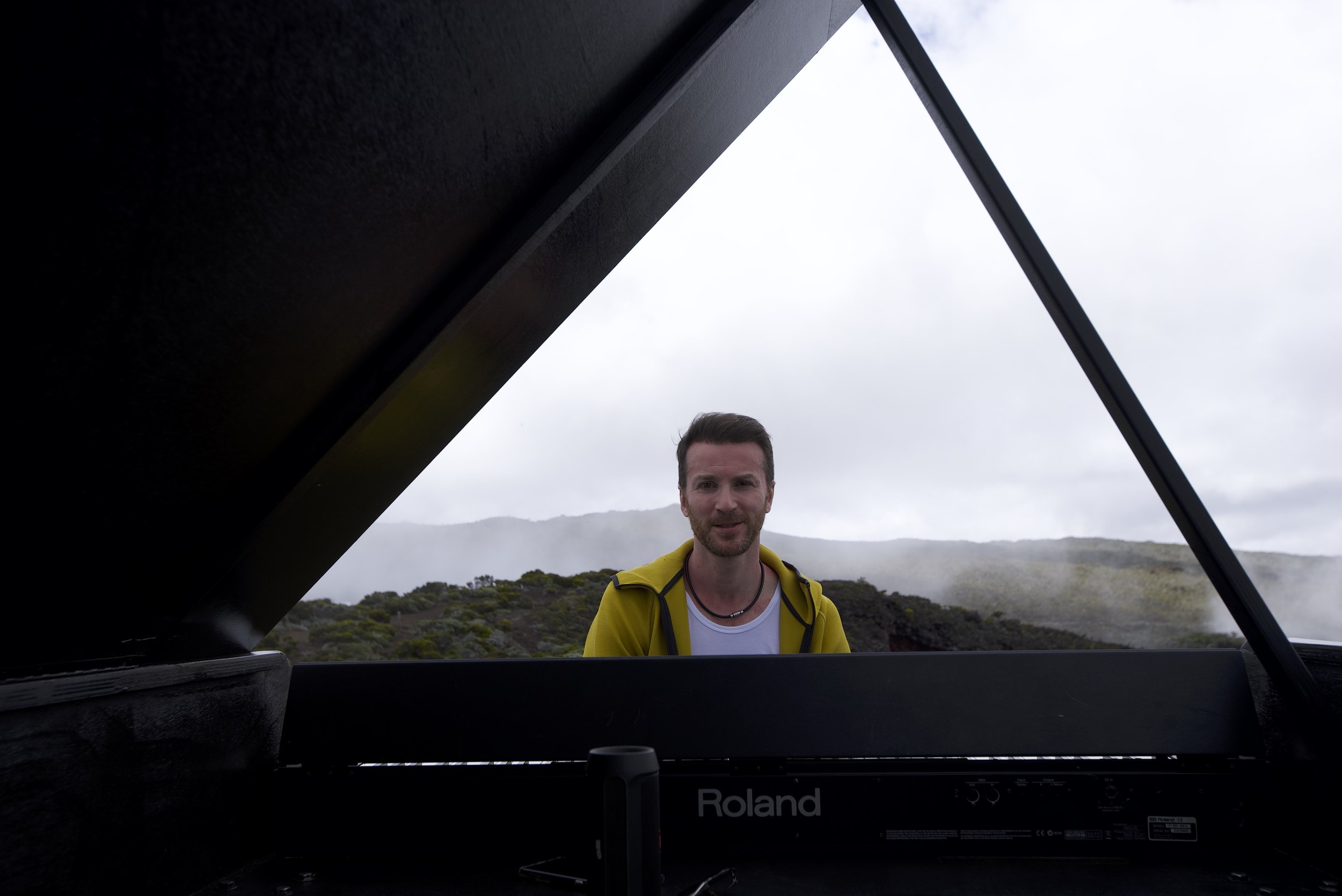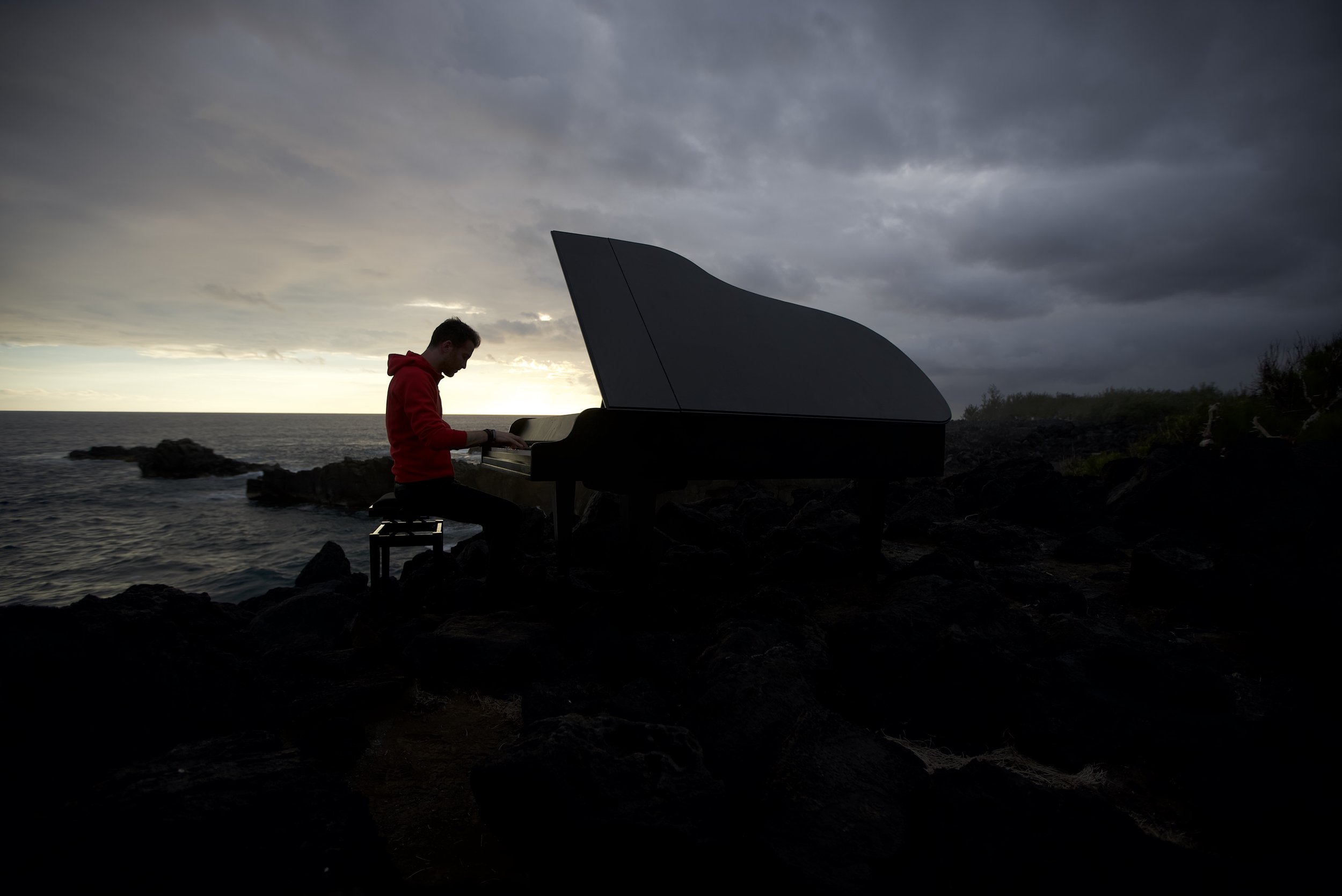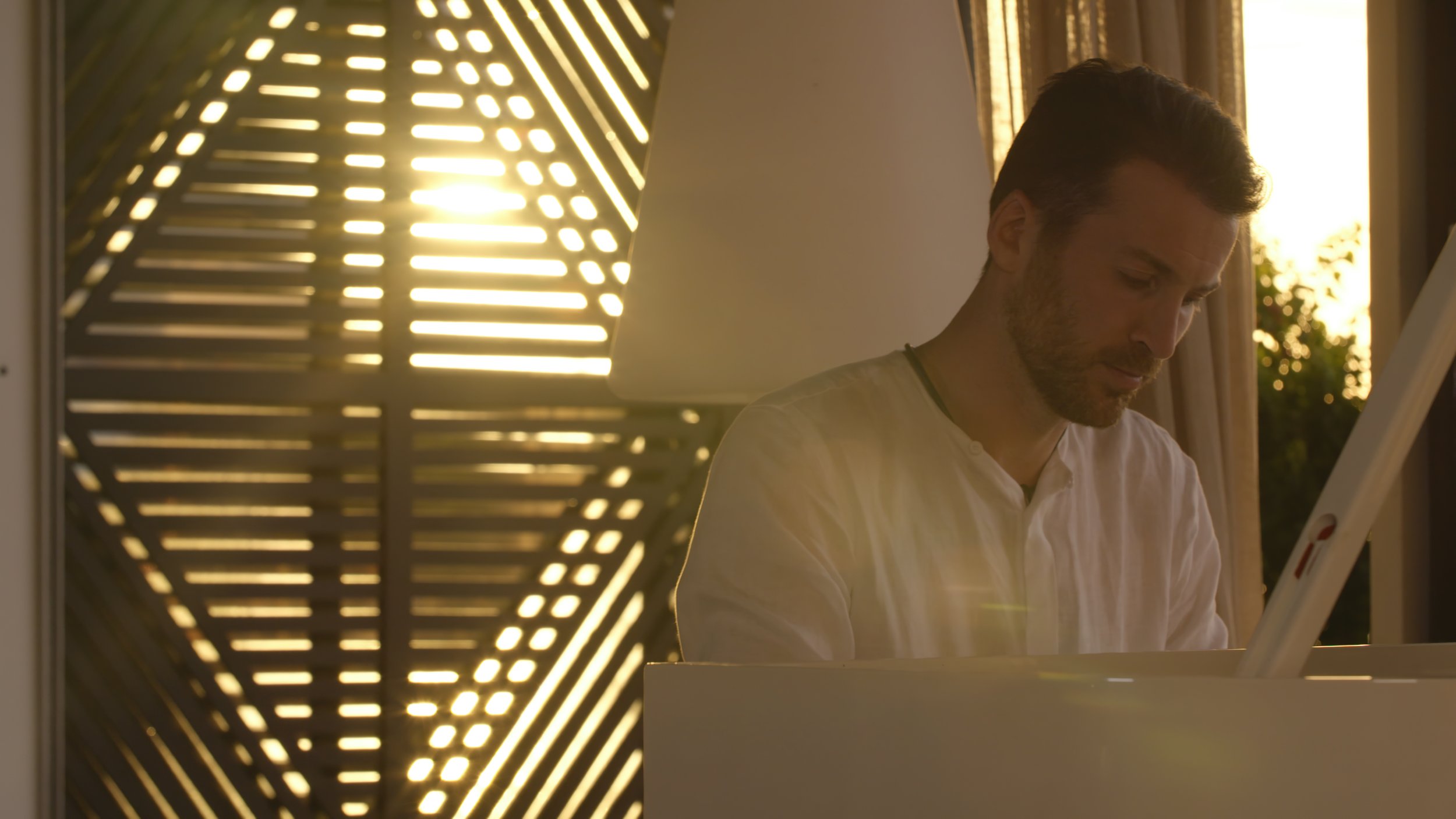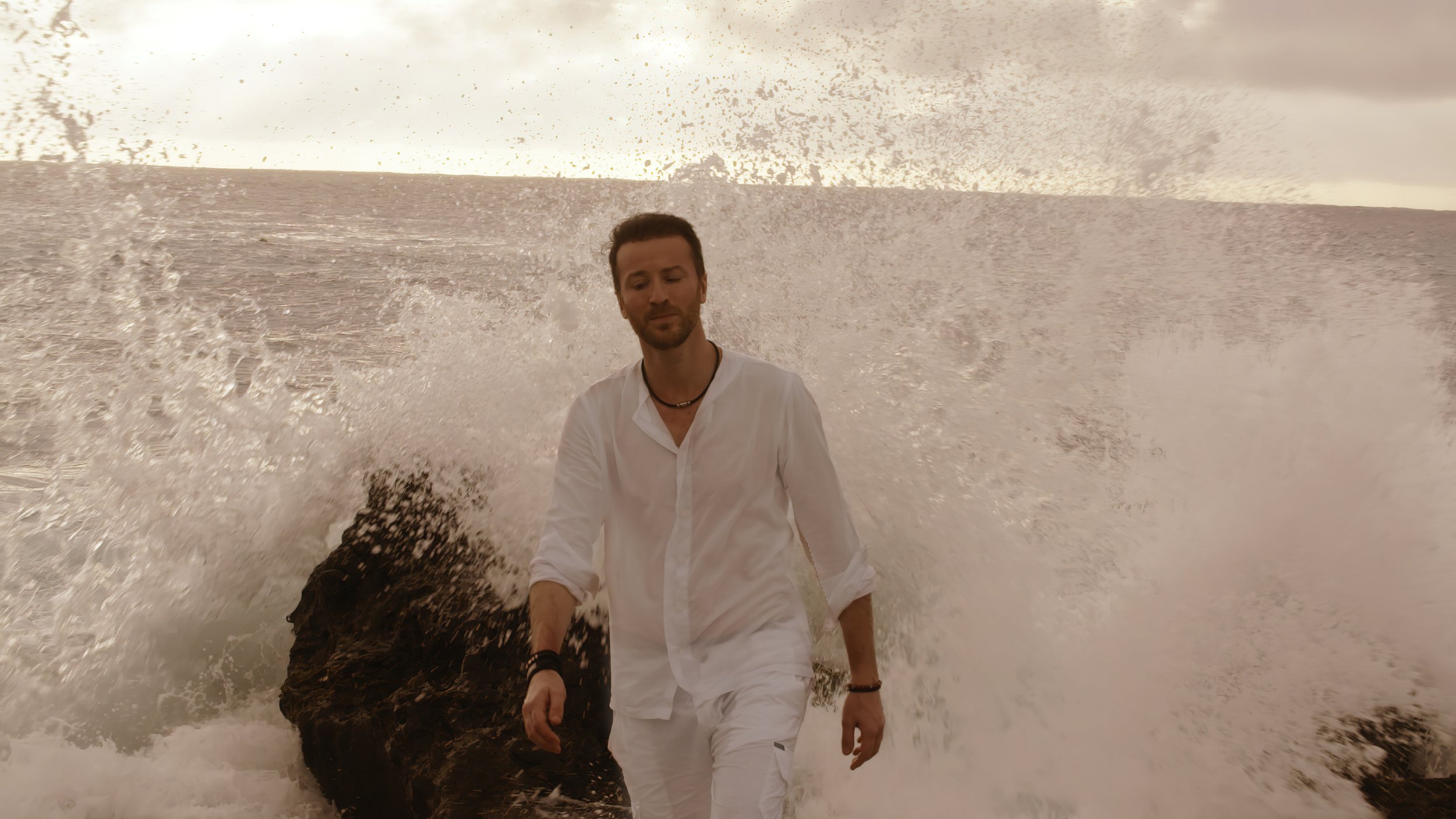Click Image to Download!
Jean-Philippe Rio-Py’s life was saved by music. The French-English pianist/composer now known as Riopy has turned his attention to changing the world, one note at a time. His third and most recent Warner Classics release, Bliss, composed and recorded during the lockdown in France, expresses the optimism and hope only someone who has experienced his harrowing life can. Riopy’s music is his sanctuary, a hallowed, sacred place where he can escape, a world he can control, shutting out all the outside noise, and a painful past.
With his first two official releases – 2018’s self-titled debut and 2019’s Tree of Light: A Call to Arms – Riopy established a worldwide reputation, generating more than 200 million streams, including 15 million alone for “I Love You,” from his solo bow, which inspired thousands of listeners to post their own performances of the song on YouTube and Instagram. The beauty of Riopy’s instrumental music is its emotional honesty -- Bliss songs like “Sweet Dream,” “Sense of Hope,” “You” and “Noah” (named for his recently born son) are powerful, direct expressions of his inner being.
“I don’t intellectualize music,” he says. “It’s all about feeling for me. This record is very important for me because ‘bliss’ is what I wanted to share. Music can heal. The purity of the piano, along with my own tuning, are designed to bring us to that state. Music can’t cure everything, but for what’s going on now, it can certainly help with our mental condition.”
Riopy’s backstory is something even a Hollywood screenwriter would consider improbable. Born in rural France, his mother left home with him when he was six months old, eventually joining a cult, where family ties were discouraged -- and obedience to the head guru was paramount. As a youngster, Riopy was abused both physically and mentally to strip him of his ego and subordinate him. Deprived of any outside culture – or even allowed to call his mother by that name – young Jean-Philippe taught himself to play on an abandoned piano when he was two, making up songs in his head, then performing them.
It’s as if Jean-Phillipe was destined to discover that piano, and his innate talent as powerful as Arthur’s ability to pull Excalibur out of a stone, empowering him to conquer the challenges that lay ahead.
“That time isn’t easy to talk about, even now, but it was my life,” says Riopy, who never did get to know his father. “It made me question the very concepts of God as love. It was very painful, but the bottom line is, I can’t isolate it from the person I am today.”
Riopy was drawn to the piano as it allowed him to focus on creating music from scratch, quiet his mind from his OCD anxieties and allow him to retreat into his own private world.
“I understood tones, sounds and numbers, because I’d always been counting,” he says. “Playing piano was the only place I felt safe. I discovered something new every time I sat down at the piano. It was the only thing I enjoyed doing. And even if I wasn’t at the piano, I’d play music in my head to cope with stress.”
By the time he turned 17, Riopy was asked to perform at a charity telethon in the small French city of Saint Maixent. It was the first time he had ever played a Steinway – “the Rolls-Royce of pianos,” he calls it – but it wouldn’t be the last. Soon, he would be adopted by the company as a face for its “Young Steinway Artist” campaign. By 18, Riopy had left the cult and his family behind – forced to cut off communications completely – and by 21, he had moved to England, where he found work in a music shop in Reading, outside London. It was there a kindly professor named Mr. Freeman (you can’t make this stuff up) recognized his talent and sent him to study music at Oxford on a scholarship, though Riopy hated the formal training, anxious to follow his own muse where it led him.
“The music set me free,” he says, recalling how it helped conquer his persistent OCD. “I discovered a place in my mind where I could compose and create. When I focused on music, it left no room for any other thoughts. It’s made me realize you don’t have to suffer to create.”
Riopy turned his obsession with counting into making music, attracted to the mathematics involved. Many of his pieces have that narrative momentum, as if he’s working out equations in his head, building the tension until it’s released in a catharsis for listener and creator alike. Playing and composing also helped him conquer his addiction to drug and alcohol which threatened to bring him down.
After Oxford, Riopy began performing around London at venues as diverse as the Royal Opera House and underground venues like The Arts Club in Mayfair. His piano compositions began attracting the attention of ad agencies and film/TV music supervisors, with his work being used in campaigns for major companies like IKEA, Mercedes, Armani and Samsung, while being heard in trailers for the films The Danish Girl and The Sense of an Ending, as well as documentaries for the BBC, ITV and Channel 4 networks in Britain.
For Riopy, whose music effortlessly conjures up images, working as a score composer allowed him to do the opposite, using his intellect to come up with music for visuals.
“They each use a different part of my brain,” explains Riopy, who has done extensive research on how music affects the physical nature of the constantly evolving brain, what he calls “neuroplasticity,” a concept introduced to him in Norman Doidge’s groundbreaking book The Brain That Changes Itself. What he learned helped him overcome the horrors of his childhood to become a productive, functioning, creative adult. He’s even taken EKGs of his own brain waves and tested the effects different kinds of music have on it.
“Every sound we hear creates a new reality for the brain, which affects the way we feel,” says Riopy. “Understanding that can help us get out of our depressions.”
Riopy has devoted his life to achieving complete “lucidity” in composing and performing, using such techniques as transcendental meditation, yoga and a sober lifestyle to provide that clean slate which has enabled his creativity.
Married – wife Sabra is now his manager – with two young children, a three-year -old daughter and a two-year-old boy – the 38-year-old reconciled with his mother upon becoming a dad, and is now ready to continue an already successful, multi-faceted artistic career.
Riopy has evolved from a Glenn Gould-style prodigy and a hypnotic Steve Reich/Philip Glass New Age minimalist to his current standing as a potential, unlikely Top 40 crossover candidate following in the footsteps of Roger Williams (“Born Free”) or fellow Frenchman Paul Mauriat (“Love Is Blue”). His new album, Bliss, is his most accessible yet, featuring a song like “Lullaby,” which could well be a pop hit with a vocal added.
“I never cared about being part of the record industry; I just care about playing,” he says. “This is about the music, not me. I must be real and authentic. I’m not a showman. I use the piano on its own because when I lay my hands on the keys, emotions cannot be faked and at this very moment, I am vulnerable, everything within is ONE to make it work – hands, heart and piano...”
And while Riopy is certainly ready to once again tour and perform for his fans, his real goals transcend that.
“I actually believe the universe is all about sound, and if we just tune it right, then we can really become a peaceful, loving world,” he says. “Technology is fine, but we should never forget that we are biological, emotional beings whose mental health is important. My contribution is music that gives hope.”
Riopy’s Bliss is now ours.











